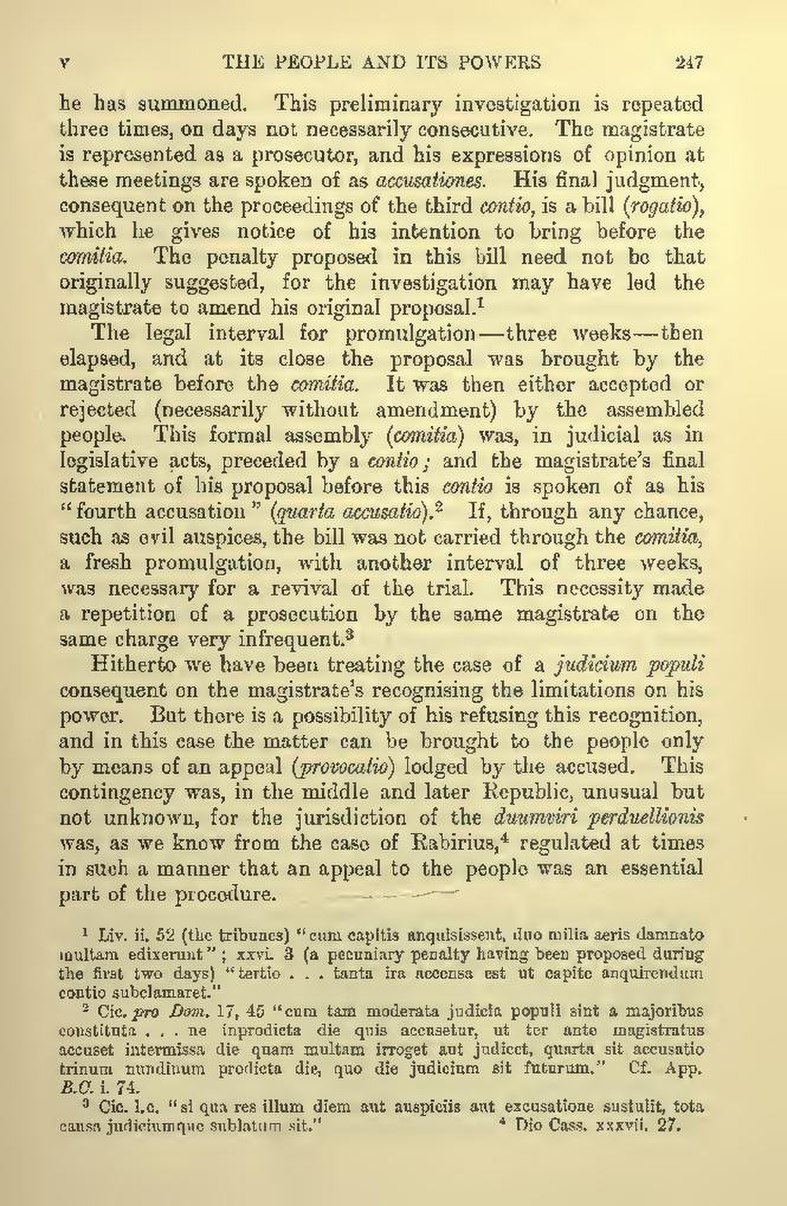he has summoned. This preliminary investigation is repeated three times, on days not necessarily consecutive. The magistrate is represented as a prosecutor, and his expressions of opinion at these meetings are spoken of as accusationes. His final judgment, consequent on the proceedings of the third contio, is a bill (rogatio), which he gives notice of his intention to bring before the comitia. The penalty proposed in this bill need not be that originally suggested, for the investigation may have led the magistrate to amend his original proposal.[1]
The legal interval for promulgation—three weeks—then elapsed, and at its close the proposal was brought by the magistrate before the comitia. It was then either accepted or rejected (necessarily without amendment) by the assembled people. This formal assembly (comitia) was, in judicial as in legislative acts, preceded by a contio; and the magistrate's final statement of his proposal before this contio is spoken of as his "fourth accusation" (quarta accusatio).[2] If, through any chance, such as evil auspices, the bill was not carried through the comitia, a fresh promulgation, with another interval of three weeks, was necessary for a revival of the trial. This necessity made a repetition of a prosecution by the same magistrate on the same charge very infrequent.[3]
Hitherto we have been treating the case of a judicium populi consequent on the magistrate's recognising the limitations on his power. But there is a possibility of his refusing this recognition, and in this case the matter can be brought to the people only by means of an appeal (provocatio) lodged by the accused. This contingency was, in the middle and later Republic, unusual but not unknown, for the jurisdiction of the duumviri perduellionis was, as we know from the case of Rabirius,[4] regulated at times in such a manner that an appeal to the people was an essential part of the procedure.
- ↑ Liv. ii. 52 (the tribunes) "cum capitis anquisissent, duo milia aeris damnato multam edixerunt"; xxvi. 3 (a pecuniary penalty having been proposed during the first two days) "tertio . . . tanta ira accensa est ut capite anquirendum contio subclamaret."
- ↑ Cic. pro Dom. 17, 45 "cum tam moderata judicia populi sint a majoribus constituta . . . ne inprodicta die quis accusetur, ut ter ante magistratus accuset intermissa die quam multam irroget aut judicet, quarta sit accusatio trinum nundinum prodicta die, quo die judicium sit futurum." Cf. App. B.C. i. 74.
- ↑ Cic. l.c. "si qua res illum diem aut auspiciis aut excusatione sustulit, tota causa judiciumque sublatum sit."
- ↑ Dio Cass. xxxvii. 27.
